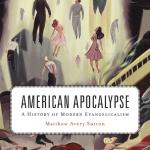Our neighbors at the Anxious Bench have been discussing Matthew Avery Sutton’s tectonic essay “Redefining the History and Historiography on American Evangelicalism in the Era of the Religious Right.”

Historians Jake Randolph of Oklahoma City University and Ansley Quiros of the University of North Alabama have posted two terrific, thoughtful conversations reacting to Sutton’s article. The first part of that conversation, with Randolph interviewed by Quiros, is here. The second part, with Quiros’ responses to Randolph’s questions, is here.
Both posts start off with a neat summary of Sutton’s argument and conclusions:
In the 1980s, in response to the rise of the Religious Right, prominent religious historians occupying influential chairs and possessing access to institutional resources, cultivated a historical “consensus” that defined evangelicalism broadly, abstractly and optimistically, and created an unbroken lineage of both orthodoxy and orthopraxy throughout American history. However, Sutton argues, this imagined evangelical consensus, (which was subsequently adopted by many prominent secular historians largely ignorant about religion who “deferred to the experts”) was accomplished only by “decoupl[ing] the movement from politics, race, class, gender and sexuality.” A more accurate historical accounting reveals that there is, in fact, “no multi-century evangelical throughline.” Rather, Sutton writes, antebellum evangelicalism is a misnomer–“so elastic you could stretch it to eternity” while post World War II evangelicalism is best understood as a “religio-political coalition”: “a white, patriarchal nationalist religious movement made up of Christians who seek power to transform American culture through conservative-leaning politics and free-market economics.” While generous to the consensus historians, Sutton’s essay helpfully dismantles their project, creating space for rearrangement and reconsideration, both historical and theological.
Sutton’s essay isn’t novel or original in itself. He’s bringing together multiple strands of criticism from decades of work by a host of scholars and others who have been pointing out the holes, contradictions, and sometimes dubious choices of this “imagined evangelical consensus.” Those strands of criticism tend to point in one direction and Sutton marshals their cumulative effect to present some refreshingly blunt, There, I Said It conclusions that have the compelling virtue of accurately describing what we’re actually seeing when we look at the past half-century of [white] evangelical history or when we look at the current state of white evangelicalism today.
The essay is, indeed, “generous to the consensus historians” because it’s not a refutation of their invaluable work, but a building on that work to carry it forward. Sutton, like others from the younger generation of historians writing at the Anxious Bench, is clearly grateful for all that we have learned from the work of those rightly revered scholars. He approaches them and their work respectfully because he respects it and recognizes it as worthy of respect. And he pays it the respect of taking it seriously, engaging it thoughtfully, grabbing the baton and running on.
Incorporating all of that substantial, well-supported criticism and heading in the direction it all points allows the conversation to move beyond what Sutton calls “the evangelical definition wars.” That’s bound to prompt some defensiveness from some of the folks invested in those “wars,” and the push-back is likely to focus on two of Sutton’s most contentious contentions, both expressed near the conclusion of his essay with clarity and concision:
I argue that post–World War II evangelicalism is best defined as a white, patriarchal, nationalist religious movement made up of Christians who seek power to transform American culture through conservative-leaning politics and free-market economics. Contemporary evangelicalism is the direct descendent of early twentieth-century fundamentalism, North and South. Both movements are distinct from Antebellum forms of Christianity. There is no multi-century evangelical throughline.
That first sentence is obviously fightin’ words, and they will get some people fighting. Those fights will, ultimately, wind up reinforcing that Sutton’s statement is truthful and accurate, because the evangelicalism of late 20th- and early 21st-century America is, rather obviously now that you mention it, “a white, patriarchal, nationalist religious movement” aligned with and in support of “conservative-leaning politics and free-market economics.”
The pushback on this will involve Sutton’s detractors inserting superlative adjectives and adverbs into that statement, then denouncing those superlatives as unfair and inaccurate. (“How dare he suggest that every discreet individual participant in evangelical Christianity is motivated solely and exclusively by …?”) And when the smoke clears from the burning of that strawman, the upshot will be that even those reflexively rejecting his description now will concede that the exceptions have proved the rule and that Sutton’s statement is broadly correct.
But the rest of that paragraph is also going to be perceived as fightin’ words by many who have previously argued for a “multi-century evangelical throughline” stretching back to Whitefield and Edwards (and Luther and Calvin, and Augustine and Paul, and David, Moses, Seth, and Adam).
Jake Randolph recognizes the shape of the dispute here and I think his discussion of it is helpful:
This is the classic “Lumper v. Splitter” debate, right? Sutton is certainly arguing as a splitter. I tend to be a splitter in my own academic storytelling. Religious movements are much more idiosyncratic and culturally circumscribed than they tend to admit, in my opinion. Especially for something like evangelicalism, a big piece of that definitional puzzle is recognizing that evangelicals want to be identified with a theological throughline.
Primitivism as an impulse drives a lot of evangelical self-fashioning, you know? But yes, I think pre-industrial iterations of “evangelicalism” become pretty unhelpful as a descriptor of what shapes evangelical identity in the US, in large part because post-WWII evangelicalism is so driven by economic changes and the marketplace.
… Sutton’s quotation of Linford Fisher is pretty apropos to this question. Fisher says that “to equate what it has meant to be ‘evangelical’ across time and space with four or five or nine or even twenty beliefs misses the rich and diverse ways the word has been used between the sixteenth century and the present. If there is any continuity in the use of the word ‘evangelical’ throughout history, it is this relative, primitivist, comparative, and contestable sense of being more true to the gospel than others, at least as defined within that particular cultural moment.”
I think Fisher’s right on here. To think that we can define evangelicals by developing better theological rubrics or finding the perfect baseline doctrinal criteria is an exercise in missing the bigger point, which is what we’ve been talking about, that theology is never divorced from the other parts of our shared life–yes, politics and economics, but also the symbols, images, myths, assumptions about the world that we inherit and allow us to make meaning out of our reality.
Randolph goes on to say that “perspicuity and primitivism shape evangelical theology to its core.” Perspicuity is evangelical-speak for the belief that the meaning of the Bible is clear, obvious, and readily apparent to any reader of good will. (“God said it. I believe it. That settles it.”) Primitivism is the idea [desire] that evangelical Christianity is the most authentic contemporary expression of authentic, early, original Christianity.
So, then, couldn’t that provide the multi-century throughline that evangelicals want/need to believe in? Couldn’t we just look to the past to find those earlier Christians similarly shaped by “perspicuity and primitivism” and rightly regard them as our “evangelical” forebears?
Randolph deals with that, too (“you may love John Calvin, but he wouldn’t love you back”) and his further discussion there is well worth your time.
Oh, and if you’re looking for an excellent, insightful critique of white evangelical “primitivism” — this idea/desire that it is the most authentic contemporary expression of early, original Christianity — there’s a whole chapter on it in Mark Noll’s magnificent The Scandal of the Evangelical Mind.
That book is, in a sense, one of the first substantial criticisms and qualifications of the “consensus” history that Sutton seeks to move past, which is why I suspect that the “prominent religious historians” who constructed that consensus won’t be as offended by his argument as some of their defenders.













